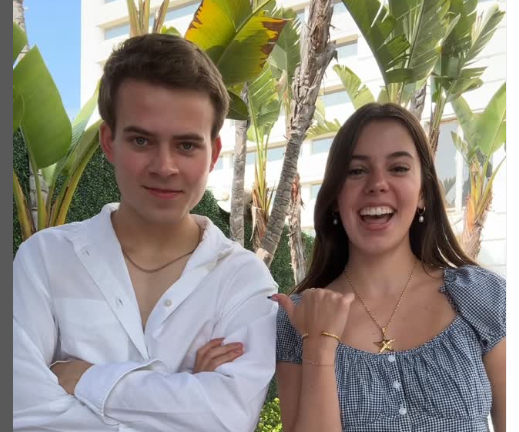In the summer of 2025, the tone of the term “Nassie” changed significantly. It suddenly started showing up in hashtags laced with heartbreak after once being associated with true sweetness and bookish romance. By the middle of August, digital rumors became verified. The couple, Nick Wilkins and Cassie, who their admirers call “Nassie,” announced their separation in a typically funny manner. Instead of a dramatic confession or a viral video, the separation was publicized with smart comments that compared their split to “your parents getting divorced,” a metaphor that was lighthearted but surprisingly poignant.

Many have found their chemistry to be incredibly efficient. Their collaboration felt genuine because of a combination of Cassie’s emotionally stirring substance and Nick’s eccentric enthusiasm. They were soon elevated to an exceptionally admired level by BookTok and the relationship-focused sections of TikTok. Warm words of support, cooperative memes, and statements that offered fans hope were all over their comment sections. Looking back, that hope might have raised expectations too much.
Nassie Relationship Summary Table
| Detail | Information |
|---|---|
| Couple Name | Nassie (Nick Wilkins + Cassie from BookTok) |
| Individuals | Nick Wilkins (@n1ckwilkins), Cassie (@cassiesbooktok) |
| Relationship Timeline | Began early 2025, split confirmed in August 2025 |
| Public Image | Wholesome, charming, relatable, deeply admired on TikTok and BookTok |
| Fanbase | Large, highly engaged, especially Gen Z and bookish TikTok followers |
| Break-Up Confirmation Style | Mutual humorous posts referring to a “parental divorce” |
Subtle changes during the last few months suggested problems. The content got more personalized. The number of duets dropped. The heart emojis that were formerly common vanished. Fans conjectured long before the soft confirmation was made, which shows how attentively influencer relationships are now examined by digital audiences—as if deciphering a serialized drama.
According to one viewpoint put up by a well-known TikTok creator, the couple’s passions were not aligned. In this account, Nick seems a little more openly loyal than Cassie. Another artist, however, disagreed with this interpretation, claiming that Cassie had been equally enthusiastic and admiring. Despite their emotional resonance, these insights are ultimately speculative. And that’s the problem: when prominent figures shield their own truths, speculation takes the place of fact.
Nick and Cassie softened the news by using subtle humor in their announcement. However, the impact on supporters was striking. Some viewers freely acknowledged that Nassie had been the reason they believed in modern love, while others uploaded wedding-themed changes with the phrase, “How it should have ended.” The emotional spectrum of reaction videos, particularly on TikTok, ranged from feigned sorrow to weeping confusion. Some even made the possibly half-facetiously humorous remark that the split “fit the mood of 2025.”
What transpired with Nassie has a striking resemblance to past internet romances that collapsed under the spotlight in the setting of influencer culture. Consider the online breakdown of couples like Liza Koshy and David Dobrik or, more recently, popular creators whose personal lives became inextricably linked to their public personas. Intimacy is fostered by the digital realm, but it also intensifies scrutiny, making every look, silence, and lone post potentially dramatic.
The idea that the breakup isn’t totally real is one particularly creative fan theory. This argument suggests that Nick and Cassie manufactured their breakup in order to recover their privacy. This is not a novel concept. By practicing detachment online while staying together offline, some creators have withdrawn from the digital gaze. The allegation gathered support for Nick and Cassie after Nick, following the supposed breakup, reposted a TikTok video of the duo, which some people thought was suspiciously cozy.
However, if it was genuine, as the majority of indications point to, it would be a very effective reminder of the psychological strain that couples face. Every moment, whether real or imagined, feels manufactured when followers impose their beliefs on a marriage. There’s not much space for normal conflict or development. Unpacking the connection turns into a kind of digital anguish, and the relationship itself turns into a brand.
Since then, Cassie has resumed publishing solo content on BookTok, frequently thanking followers while avoiding talking about breakups. Nick, on the other hand, is still present but selective. His tone has changed, becoming more reflective and possibly more emotionally varied. Both are opting for a gradual restoration to individual presence rather than confronting the divide head-on.
Their split is consistent with a broader social trend. Though they suffer with the aftermath when marriages fail, audiences are becoming more and more interested in creator couples. Additionally, creators, particularly young ones, need to strike a balance between branding, storytelling, and their own emotional realities. That equation is really delicate.
Nick and Cassie steered clear of sensationalism by using measured communication and careful timing. In an environment when breakups are frequently commercialized or embarrassingly public, that is especially admirable. They safeguarded both their own and their followers’ honor. The duo has demonstrated an incredibly successful method of subtly changing narratives without anger or regret, even if some admirers are unwilling to move on.
Nassie’s split raises a more significant cultural query regarding online romance: Will love be able to withstand the algorithm? Amazingly adaptable as content producers, they were able to develop separately while coexisting as a team. Their split may be a reflection of their development rather than a sign of failure. They grew up, understood their limits, and went on.
